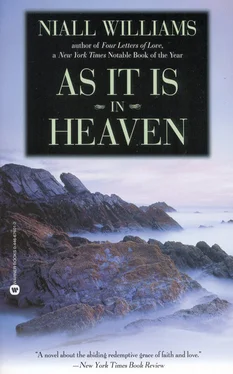“Gabriella, is it you? Here, let me help you.”
A hand touched her shoulder and held it firmly. And when Gabriella Castoldi turned about on the street of Kenmare she saw the face of Nelly Grant.
“I knew you would come back,” Nelly said. She was whispering to the air and had the glad expression of a reader who looks up and smiles, having re-encountered a favourite character deep into the book. “Easy now, just lift your head a little and breathe. That's it,” she said, “breathe.” She supported Gabriella's head until it faced the heavens, then announced: “It's a baby. Of course. Nelly Grant, you old fool.” She shook the wild wool of her head at the plotting of the stars, then led Gabriella across the street to her shop. “Everything will be all right now,” she said, in a tone which Gabriella could not decide was either predicting the future or warning God.
The arrival could not have been better timed. For a week Nelly Grant had been studying the energy of the new year. Years earlier she had chosen to live in Kenmare for the purity of its air and the translucent quality of the light through the passes of the Kerry mountains, for the feeling of arrival she had felt the first moment she came down through Moll's Gap. But more than this was the certainty of her belief that such places were the last sanctuaries of an ancient spirituality. She had read widely books of Celtic folklore, studied the uses of all the indigenous plants, eaten wild haws and sipped sloe wine, learned to read Old Irish texts, and recite prayers, enchantments, and spells that addressed the souls of woods trees and rivers, until at last she had grown to believe that in the mountains and valleys of west Kerry there existed a kind of spirit world contemporaneous with this one. It was beside us all the time. No corner of Kerry was without its ruined cottages, roofless stone places where the dead had left their names, where O'Connell's Crossroads existed one hundred years after the last O'Connell died, and where the presence of the vanished lingered like an after-scent in the great emptiness of the landscape. The spirits, Nelly knew, were there all along. They had no inclination to leave and coexisted in the brambles and ditches, living through all seasons without remorse or age but taking from winter and spring alike the same joy in the turning rhythms of the world, living as it might have been intended without the regret of time passing. The spirits lived on like the mountains and the streams, and by the time Nelly Grant had passed her fiftieth birthday, she had begun to feel in Kenmare the comfort of their acquaintance.
Saint Brigid's Day, she told Gabriella, when she had settled her in the humpy couch and knocked alive the low sods of turf in the hearth of her house, was the beginning of springtime in the old Irish year. It was the feast day of the favoured saint who was patroness of cattle and livestock, who had promised fine weather and the bounty of a good season. It was not her saintliness that Nelly loved, she explained, but the real woman whose presence she felt beyond the veils of legend. That first Brigid, who was a woman so in tune with female energy, she imagined, that the earth itself had responded to her and released the first larks of early Irish spring in premature excitement. Brigid was a kind of pagan figure; she was in the moon's rhythm and felt the ripeness of the soil underfoot for the fall of seeds. She was good tidings, and the fact that Gabriella had arrived on her feast day was interpreted by the herbalist as an indication of the goodness ahead.
“It's a juncture, a doorway today. It means,” Nelly told Gabriella, “that we have come through the winter and now have a little feast of thanks.”
In the low light of her cottage and the burning of scented candles Nelly cut into a thick cake made of carrots, seeds, and raisins and served her visitor.
“There is this little prayer,” she said, “ Teighidh ar bhur nglunaibh, agus fosclaidh bhur sula agus leigidh Brid isteach. Go on your knees, open your eyes, and let Brigid in.” She paused; her eyes glinted with the candles as if seeing visions of the Holy Ghost. “I think it's lovely. Let Brigid in. What it can mean, do you know?”
“Yes,” Gabriella said weakly, and the Englishwoman and the Italian said together the fragment of ancient Irish. They ate the cake and drank strong herbal tea. Nelly scattered pieces outside the front door for the passing spirits and the ones that took the form of birds.
Gabriella slept that night in the house of Nelly Grant and in the brittle frosted starlight was revisited by dreams of the dead. Her mother was pregnant as a moon. She lay on the bed with the blankets pulled down and the doctor listening to the white orb of her belly for the secrets of the unborn's future. He was tapping on her skin with pink fingers whose fleshy tips betrayed the richness of his asparagus risotto diet and made a softened, muffled popping with each tap. His stethoscope he removed and clipped about his neck, raising his chin and then lowering it at the odd angle of a violinist, until his ear touched the moon belly and he listened. He told la senora Castoldi to breathe deeply and then hold her air like some inflated cartoon, so that he could hear nothing but the secret life of the child inside her. He tapped. He tapped quavers in quick time, he tapped in diminuendo, and then switched rhythms until he was pulsing with his fingers the flurried notes of a new allegro.
“What are you playing at, Doctor?” la senora asked him.
“Vivaldi's ‘Summer,’” he said, and tapped on, his face against the creamy smell of her skin and his ear listening on the other side of where Gabriella was hearing that first music and flicking about her tiny body in response.
“Play music in the room, you might save this one,” said the doctor when he stood up at last. “Her spirit dances.”
He walked out of the dream from where Gabriella saw him in the womb, and she thrashed in the blankets and hummed broken music, until at last she stopped and heard it playing, and it was her father playing his fingers on her mother like a bow on strings, making a music both harmonious and discordant in turns, a music that rose and filled Gabriella's sleeping until she dreamt she could feel the child inside her dancing to it.
In the morning Gabriella awoke to the tender February light with a new feeling of calm. She had told Nelly the night before that she felt she could never know the reality of true love or the certainty of goodness sometimes given to the sainted or the insane. There was no answer to that, Nelly Grant had told her, but she herself had learned slowly, stubbornly, and with the deepest resistance that at last we must trust the energy of things, to wait and feel the tug of the planet as it swings round and carries us all relentlessly forward.
“Everything,” she said, “is not up to us. The thing is, Gabriella, to care for the child, Yes?” she said, and sounded almost in echo of Maria Feri as she pressed her warm palm on the woman's stomach.
Now in the new day Gabriella sat in the kitchen, where the door was open to the view of the mountains and the birds came and went across the dew-silvered grass. The air was fresher than in Venice, and the pale blue of the sky seemed the colour of mercy. The calm Gabriella felt was like the furled bud of the season, and for the first time that morning she dared to imagine it flowering. Imagine, she thought, imagine just for a moment it could be perfect.
She opened the case of her violin and, as if for many children, born and unborn, she played her music out the cottage door.
 There was a small congregation at the funeral of Philip Griffin. Snow flurried in the air. The roads were iced and the limbs of the trees beseeching. A little cluster of old men in well-cut coats and felt hats stood at the graveside like last sentries, watching the disappearance underground of another of their world and time. The son of Tobias Madigan was there. He gripped Stephen's hand with gloved fingers and held his eyes with his as if he glimpsed there the retreating figure of Philip Griffin skating away across the immaculate ice of the heavens. Then he released the hand and said, “He was a good man. A lot of good men are gone now.”
There was a small congregation at the funeral of Philip Griffin. Snow flurried in the air. The roads were iced and the limbs of the trees beseeching. A little cluster of old men in well-cut coats and felt hats stood at the graveside like last sentries, watching the disappearance underground of another of their world and time. The son of Tobias Madigan was there. He gripped Stephen's hand with gloved fingers and held his eyes with his as if he glimpsed there the retreating figure of Philip Griffin skating away across the immaculate ice of the heavens. Then he released the hand and said, “He was a good man. A lot of good men are gone now.”
Читать дальше

 There was a small congregation at the funeral of Philip Griffin. Snow flurried in the air. The roads were iced and the limbs of the trees beseeching. A little cluster of old men in well-cut coats and felt hats stood at the graveside like last sentries, watching the disappearance underground of another of their world and time. The son of Tobias Madigan was there. He gripped Stephen's hand with gloved fingers and held his eyes with his as if he glimpsed there the retreating figure of Philip Griffin skating away across the immaculate ice of the heavens. Then he released the hand and said, “He was a good man. A lot of good men are gone now.”
There was a small congregation at the funeral of Philip Griffin. Snow flurried in the air. The roads were iced and the limbs of the trees beseeching. A little cluster of old men in well-cut coats and felt hats stood at the graveside like last sentries, watching the disappearance underground of another of their world and time. The son of Tobias Madigan was there. He gripped Stephen's hand with gloved fingers and held his eyes with his as if he glimpsed there the retreating figure of Philip Griffin skating away across the immaculate ice of the heavens. Then he released the hand and said, “He was a good man. A lot of good men are gone now.”









